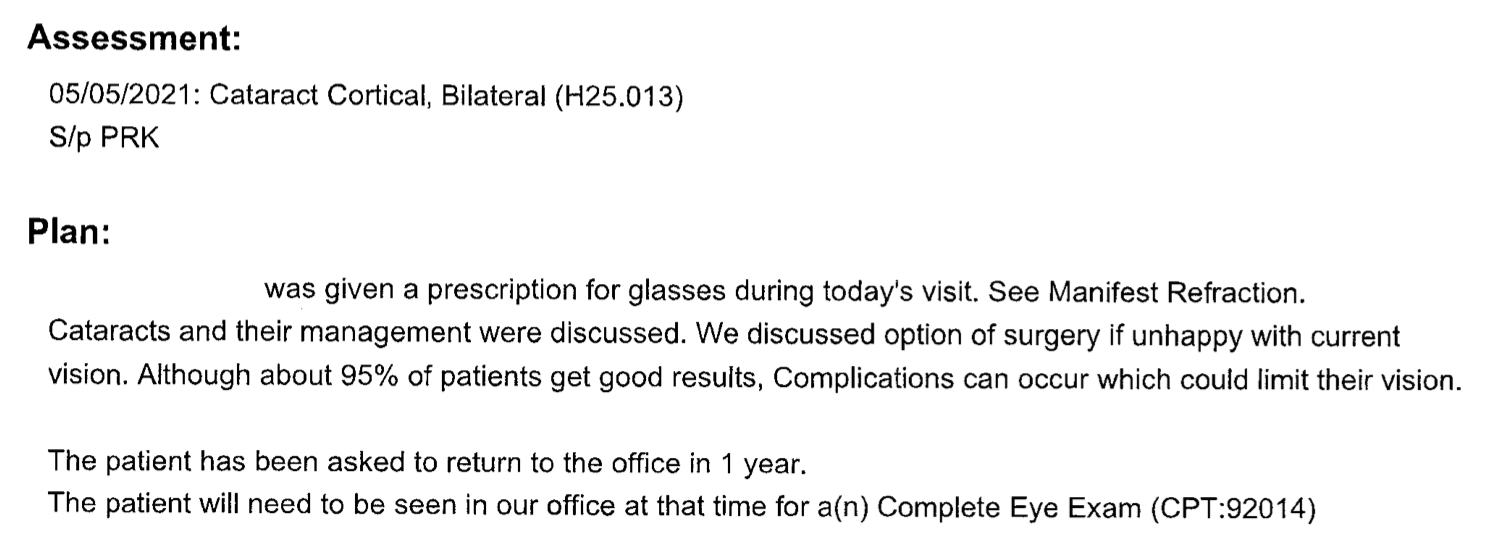Cataracts
-
Mrs. George has had progressively worsening vision over the last few years. She had a PRK done in the late 1990s (a precursor to LASIK).
She's been seeing a guy that I used to work with since that time. Let's call him Ed. She saw him in May and he did a full exam (I was in the room with her). He said that her vision has deteriorated and gave her a prescription for eyeglasses (she's used readers for a while).
Something just didn't sit right with me and her for this.
I reached out to a guy at the university who recommended an opthamologist. She saw her about 2 weeks ago and said that Mrs. George has bilateral cataracts, and they are probably the cause of her failing vision (can't read street signs, doesn't want to drive at night), and recommended bilateral cataract surgery - scheduled for October.
Because of her history of PRK, the new doc wanted Ed's records so they can to proper refraction of the lens implant, etc. So, I sent them a request for Mrs. George's records. I got them a few days ago.
From 4 years ago. Mrs George said that he mentioned the cataracts but said that they were probably not an issue (yet):

From the visit in May:

I WAS THERE and the word "cataract" was never even said during her visit.
I never really cared for Ed's style in the OR, but he apparently got good results, and his care for the Mrs. was OK, I guess.
But, we're not going back. I'm pissed. Not so much because she needs the surgery, but what he said in the room is totally different from what he said in the chart.
-
Good decision.
I know I have spoken here about two hospital overnights I had in 2001, a couple months apart. In each I spoke to the same several specialists about the same issue. When I got my chart back from the Boston hospital each transcription was spot on. When I got them from Cincinnati I have no idea who they were talking to but it surely wasn’t me.
-
Most people in their sixties have developed cataracts. People who have been on the medication your wife has will usually have some problems earlier. My wife already has trouble driving at night, so they glare tested her.
Most docs let 'em rock until the patient starts to complain and then options should be discussed.
Sounds like her guy was using canned stuff for the electronic chart.
-
I have bilateral cataracts, and my vision, other than reading is fine. They were diagnosed about 4 years ago, and for my yearly exam, Brian tells me they've not changed.
Mrs. George's vision DID change, and Ed dismissed her concerns by offering a refraction correction. OK, he didn't appreciate the fact that the cataracts might be the problem (which the new doc does). I'm willing to chalk that up to being a mediocre opthamologist.
But to write in the chart about a discussion regarding cataracts when that discussion never occurred....
-
Followup:
Mrs. George had her left cataract done last week, on Thursday. They took her to the OR at 12:02. I got a text saying that surgery was done, and she was in post-op at 12:22.
A bit of pain (Tylenol-type) the first day.
1st post-op visit (on Friday) was just a "let's make sure nothing bad happened" type of visit.
2nd post-op visit was today. She says that now, with the non-operative eye, everything looks "yellow." The operative side looks "more white" (don't, just don't). The doc said that her vision in that eye was 20/80 before surgery. Today, it's 20/25, and she thinks it'll improve over the next few weeks as swelling subsides. She's very pleased so far.
She opted for the "standard" lens, which will be good for most things, but will probably still need reading glasses for near stuff - reading. The premium lens would be about $3K more. She can buy a lot of glasses at Walgreens for $3,000.
Her right (better) eye is scheduled for next week, on Thursday again, and she's looking forward to it. The only hassle is wearing the shield at night, and the 4 x day drops.
It just amazes me how this surgery, which was a BFD when I started training, has become a nothingburger now.
I always told my patients that cataract surgery is easier than the dentist. They never believed me, until the first one was done.
-
Followup:
Mrs. George had her left cataract done last week, on Thursday. They took her to the OR at 12:02. I got a text saying that surgery was done, and she was in post-op at 12:22.
A bit of pain (Tylenol-type) the first day.
1st post-op visit (on Friday) was just a "let's make sure nothing bad happened" type of visit.
2nd post-op visit was today. She says that now, with the non-operative eye, everything looks "yellow." The operative side looks "more white" (don't, just don't). The doc said that her vision in that eye was 20/80 before surgery. Today, it's 20/25, and she thinks it'll improve over the next few weeks as swelling subsides. She's very pleased so far.
She opted for the "standard" lens, which will be good for most things, but will probably still need reading glasses for near stuff - reading. The premium lens would be about $3K more. She can buy a lot of glasses at Walgreens for $3,000.
Her right (better) eye is scheduled for next week, on Thursday again, and she's looking forward to it. The only hassle is wearing the shield at night, and the 4 x day drops.
It just amazes me how this surgery, which was a BFD when I started training, has become a nothingburger now.
I always told my patients that cataract surgery is easier than the dentist. They never believed me, until the first one was done.
